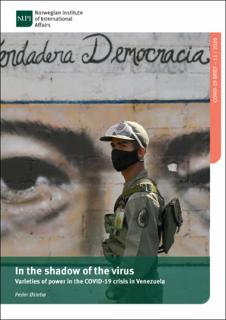| dc.contributor.author | Østebø, Peder | |
| dc.date.accessioned | 2021-03-19T13:17:06Z | |
| dc.date.available | 2021-03-19T13:17:06Z | |
| dc.date.created | 2020-12-18T10:12:36Z | |
| dc.date.issued | 2020 | |
| dc.identifier.uri | https://hdl.handle.net/11250/2734516 | |
| dc.description.abstract | While all states face massive challenges when responding to COVID-19, some are in a more precarious position than others. In Venezuela, the pandemic arrived at the worst possible time for its citizens. Facing one of the deepest economic crises outside of wartime in recent years, its consequences have spilled over to all aspect of social life.1 However, the timing seems to have suited the leaders of the Venezuelan regime well. Rather than constituting a threat to the stability of a regime that has lost both democratic legitimacy and the capacity to provide services and security, the government of Nicolas Maduro (2013-present) has seemingly managed to consolidate itself after several years of instability.2 The starting point of the discussion is an apparent paradox: how can a regime with neither legitimacy nor capacity, two commonly invoked criteria for effective crisis management, strengthen itself during a crisis such as that spurred by COVID-19? The brief presents an overview of how the Venezuelan regime has responded to COVID-19, and how the government of Nicolás Maduro has applied different strategies to consolidate a favorable political status quo. It takes as its starting point three concepts, namely “state capacity,” “legitimacy,” and “power,” all of which are frequently upheld as fundamental for understanding the varying ways in which states have responded to the pandemic. It highlights how relative power relations have shifted in recent years, and how the pandemic has contributed to skewing the balance of power further in favor of the Maduro government. | en_US |
| dc.language.iso | eng | en_US |
| dc.publisher | NUPI | en_US |
| dc.relation.ispartof | NUPI Covid-19 Brief | |
| dc.relation.ispartofseries | NUPI Covid-19 Brief;2020-11 | |
| dc.rights | Navngivelse-Ikkekommersiell-DelPåSammeVilkår 4.0 Internasjonal | * |
| dc.rights.uri | http://creativecommons.org/licenses/by-nc-sa/4.0/deed.no | * |
| dc.subject | Pandemi | en_US |
| dc.subject | Pandemic | en_US |
| dc.subject | Styring | en_US |
| dc.subject | Styring | en_US |
| dc.subject | Sør- og Mellom-Amerika | en_US |
| dc.subject | South and Central America | en_US |
| dc.title | In the shadow of the virus Varieties of power in the COVID-19 crisis in Venezuela | en_US |
| dc.type | Research report | en_US |
| dc.description.version | publishedVersion | en_US |
| dc.subject.nsi | VDP::Internasjonal politikk: 243 | en_US |
| dc.subject.nsi | VDP::International politics: 243 | en_US |
| dc.source.pagenumber | 9 | en_US |
| dc.source.volume | 2020 | en_US |
| dc.source.issue | 11 | en_US |
| dc.identifier.cristin | 1861429 | |
| cristin.ispublished | true | |
| cristin.fulltext | original | |

